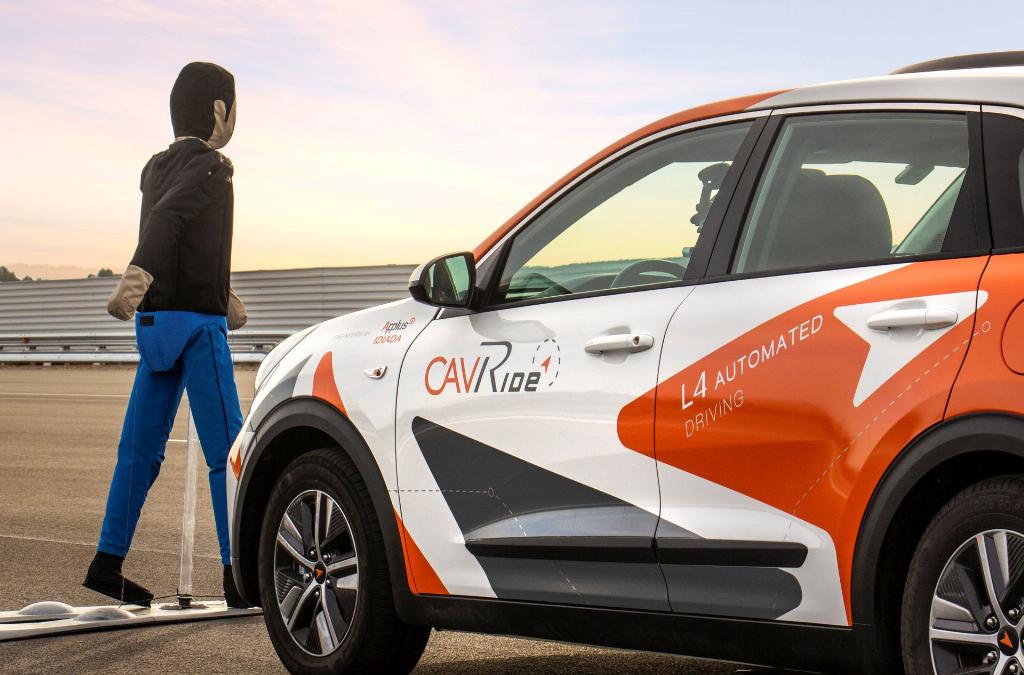Driving investment in AV manufacturing

In this article Scott Henderson, CEO of innovation funding advisers ABGI UK discusses the future and potential benefits of the autonomous electric vehicle market for UK manufacturing.
In this article Scott Henderson, CEO of innovation funding advisers ABGI UK discusses the future and potential benefits of the autonomous/electric vehicle market for UK manufacturing.
With international competition on the rise, the UK is maintaining its course to become a world leader in the burgeoning electric and autonomous vehicle (AV) sector.
According to Allied Market Research, the electric vehicle market alone is expected to be worth an estimated $802bn (USD) by 2027, a compounded annual growth rate of more than 22%.
Last month the UK Government allocated an additional £65m to accelerate development of future industries, including those focused on battery technologies for electric vehicles, through its Industrial Strategy Challenge Fund.
In June a further £12m was committed towards ground-breaking research into zero emissions transport. The funding, part of the UK Government’s efforts to deliver a post-pandemic green recovery, includes £10m for a new Zero Emission Vehicle Innovation Competition. This will invite project funding bids from companies to support advancements in both battery electric and hydrogen vehicles, as well as charging infrastructure.
Meanwhile, this year’s Autonomous Vehicle Readiness Index (AVRI) published by KPMG ranked the UK as ninth in the world in the global AV sector. Singapore topped the list. This report takes into account four key factors determining which country will most likely have AVs on the road first: forward-thinking in policy and legislation; technology and innovation; infrastructure; and consumer acceptance.
While the UK fell two places from the 2019 Index, it did maintain its place as the second ranked nation in terms of policy and legislation. This was further bolstered by the UK Government’s review of its regulatory framework for AVs which explores regulations for public service vehicles, including those which uphold public safety.
Government backing
Other reasons for British industry to remain optimistic include the combined investment of around £200m by the UK Government and industry into establishing six test facilities for AVs in south-east and central England. The UK has also established itself as the world leader in cyber security within the AV sector, a critical requirement which will undoubtedly support its further development.

Meanwhile the UK Government is further investing in the sector through its Centre for Connected and Autonomous Vehicles (CCAV). Over the summer it launched a consultation on the use of hands-free driving technology on motorways in England, Scotland and Wales. This is the latest in a long line of CCAV initiatives aimed at developing, testing and commercialising driverless vehicle technology. Industry experts have described this as the most advanced consultation of its kind and one that demonstrates the UK Government’s ambitions to ensure the nation remains a global leader in this sector.
COVID-19 has now put an enhanced focus on how transportation is impacting on the environment, creating huge opportunities for the global electric and AV industry to make giant strides forward. But is the UK in a position to fully capitalise on this?
While much of the manufacturing capacity for the electric and AV sector is currently situated in other parts of the globe, Britain continues to develop a strong reputation as an innovation centre for design, technology, testing and other aspects of the supply chain for the vehicles of the future.
One shining example of this is ABGI-UK client Astheimer, based in Warwick. Founded by Carsten Astheimer, who serves as the company’s creative director, his company works with a number of software providers and manufacturers to provide ergonomic design solutions for mechanical and technology components.
Carsten’s own view of the AV sector is that it may take several decades before we see driverless cars commonly operating on our streets without human supervision. He does, however, believe we are currently making good progress on ‘Level 3’ developments, which include automated functions in vehicles such as braking, steering and accelerating.
He expects to see fully autonomous vehicles initially gaining traction here for commercial use in large depots, for example, or in off-road environments. Compared with those operated by human workers, AVs could provide a safer and more efficient option in these kinds of controlled commercial environments.
Truck investment
This is the likely thinking behind the recent £2.42m grant from the Department for Digital, Culture, Media and Sport (DDCMS) to fund a new 5G self-driving truck trial at Nissan's Sunderland plant. This project, led by a consortium which includes Sunderland City Council, Newcastle University, and StreetDrone, will trial 40 tonne self-driving trucks with a focus on futureproofing logistics in the UK. StreetDrone will develop both software and hardware solutions spanning redundant braking systems, a driving robot capable of complex articulated truck manoeuvres in confined areas and the integration of driverless software with telematic control for remote fleet management.
Innovation is key to this industry. As demonstrated by the DDCMS grant, the UK Government has been supportive with targeted programmes, including R&D tax relief which incentivises companies to invest in innovation in return for significant tax breaks.
Designed to maintain the country’s position as a global leader in science and technology, R&D tax relief offers innovative companies – and there are many within the electric and AV sector - up to 33p for every pound spent on qualifying R&D depending on their status and financial position.
Digital mapping company Navmii is another innovative UK-based company which has benefitted from R&D tax relief. While the company’s English founder, Peter Atalla, has now relocated to San Francisco to launch spin off business Voxel Maps, he believes the incentives on offer for the electric and AV sector in the UK are generous. The sector here further benefits from a strong talent pool, especially via Oxford and Cambridge Universities.
However, to take the industry to the next level, he feels the UK needs to see the development of a “bigger cluster of likeminded British-based companies as well as further creative tax incentives, such as those currently on offer in Portugal to entice entrepreneurs.”
Tax relief support
Cambridge-based Applus IDIADA is another emerging success story which has also been supported through R&D tax relief claims and other UK Government incentives, which it has reinvested into its business. The company provides design, engineering, testing and homologation services for the wider automotive sector, with an increasing focus on the electric and AV market where there is a constant drive towards new innovation.

Many positive developments have ensued since the creation of the Automotive Council, set up in 2009 to enhance dialogue and strengthen co-operation between the UK Government and the automotive sector. A recent example of this has been TestBed UK funding, which has been particularly beneficial for innovative companies like IDIADA.
The devastating impact of the global pandemic combined with a potential No Deal Brexit at the end of this year leaves the UK facing an immensely challenging economic future. A key modern industry like the electric and AV sector has the potential to help deliver the much-coveted green recovery and rebuild our economy going forward.
It is therefore vital that we continue to invest at all levels to ensure the sector remains world class. While much of this investment in innovation will come from companies within the sector, the Government must also continue to channel focused resources to support these efforts. At a time where public funds are being increasingly stretched, maintaining grants and innovation incentives through the tax system will be crucial in ensuring the industry can fulfil its potential.
ABGI UK














